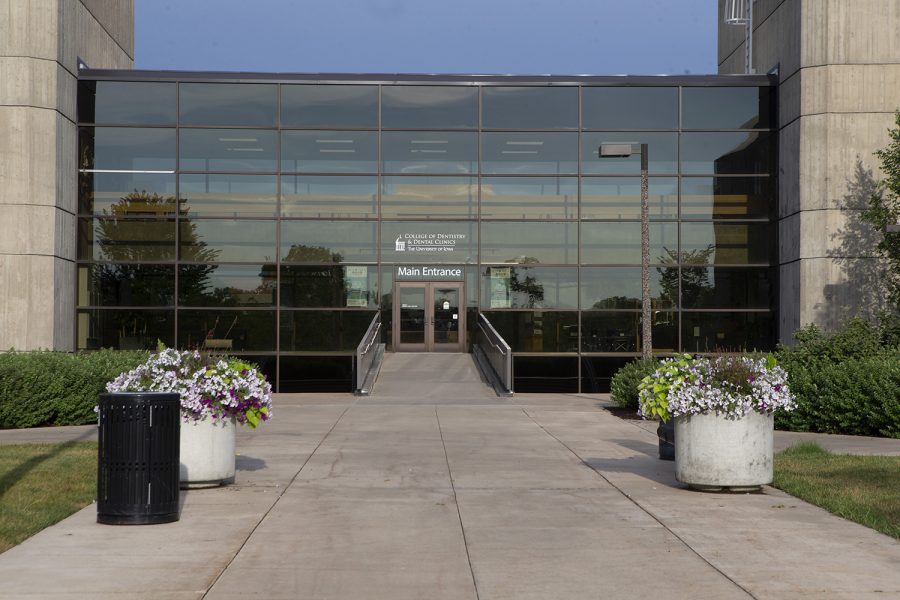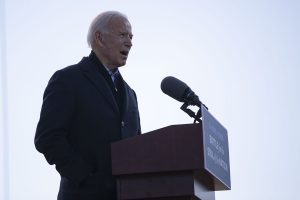Iowa legislators weigh in on College of Dentistry ‘free speech’ concerns
Republican state legislators advocated on behalf of a conservative student in the UI College of Dentistry, which led to a canceled disciplinary hearing meant to discuss the student’s unprofessional conduct in a public email thread.
The UI College of Dentistry and Dental Clinics building is seen on July 17, 2019.
December 3, 2020
What started as an email thread in the University of Iowa College of Dentistry turned into a battle over free speech on campus, roping in Iowa Republican legislators.
One lawmaker advocated on behalf of a UI College of Dentistry student, after a disciplinary hearing was scheduled for Michael Brase who hit ‘reply all’ on a college-wide email that condemned a White House executive order.
In a letter signed by Associate Dean for Student Affairs Sherry Timmons on Nov. 9, Brase was summoned to a disciplinary hearing to discuss “unprofessional behavior.” Brase then contacted about a dozen Republican state legislators.
“My main hope was that I would be able to recruit allies to my side to help me out with that disciplinary hearing,” Brase said.
Two days later, Brase was notified by College of Dentistry Dean David Johnsen that his hearing was canceled.
Brase confirmed that he corresponded with state Sens. Brad Zaun and Amy Sinclair, both Republicans, but Zaun and Sinclair did not respond to The Daily Iowan’s request for comment. He also confirmed that he spoke with state Rep. Steve Holt, R-Denison.
Brase would not comment on who else he reached out to or how many responses he received.
Holt, chair of the House Judiciary Committee, was the only legislator who attended a meeting with UI President Bruce Harreld, Johnsen, and UI lobbyists, which ultimately led to the cancellation of the hearing.
On Oct. 16, the College of Dentistry released a statement condemning a White House executive order that prohibits workplaces and public institutions from anti-American diversity, equity, and inclusion training that facilitates race and sex “stereotyping” and “scapegoating.” The order also includes language that does not acknowledge the role systemic racism plays in American society.
Brase, who identifies as a conservative Republican, replied to the statement, sending an email to about 1,200 people asking the college to clarify their position and if they support using federal funds “to promote trainings that include race/sex stereotyping and/or race/sex scapegoating.”
“It was absolutely unacceptable that he was threatened with legal action simply for disagreeing with the position taken by the dean of the school,” Holt said.
Brase’s email triggered a thread where several other students and faculty members replied to the college’s statement, sharing their view on President Trump’s stance on diversity, equity, and inclusion training, with some faculty members writing that they do not support Black Lives Matter.
Brase said his main issue was the “political way” the college and UI administration condemned a policy that resonates with a lot of people in Iowa.
Trump won Iowa with 53.2 percent of the vote and Joe Biden received 45 percent of the vote. This is an increase from 2016 when Trump won 51 percent of the vote to Hillary Clinton’s 41 percent.
“I think that if they want to be able to use the public communication they did to make political statements like that, then they also have to realize that by opening that door … other people have a right to disagree with those political statements,” Brase said.
Holt called this an issue of free speech, saying the UI has suppressed conservative voices in the past.
In March, Iowa Gov. Kim Reynolds signed a bill that requires state universities and colleges to adopt policies that allow “the fullest degree of intellectual freedom and free expression.” Legislators in both chambers voted for the measure mostly on party lines, with some Democrats taking issue with a line in the bill that allows for student groups to bar certain students from leadership positions based on their identity.
Holt said he wants to work on additional free speech measures in the upcoming Iowa legislative session, but said he did not have any specifics on what that legislation would look like or if it would be a bipartisan effort.
Holt did say that he thinks the First Amendment should protect speech that we hate, like from Nazi groups.
“I came to realize that the best way to expose the horrors of racism or the horrors of say, a Nazi group … is to give them the air of day, let them be heard, because that’s when it is shown just how horrible they are,” Holt said. “…that’s why we have to be very careful to protect free speech, particularly the free speech of those we don’t agree with.”
State Rep. Mary Mascher, D-Iowa City, said she was first informed of the events that took place in the College of Dentistry when she was contacted by Donald Macfarlane, professor in the Carver College of Medicine and chair of the Protection of Speech Committee, a committee Macfarlane formed himself that includes both university employees and members of the Iowa City community. This committee is not sanctioned by the college.
Macfarlane asked Mascher to sign on to support an external review committee to investigate the situation, but that the UI does not have enough internal funds to make this happen. In a Nov. 13 email sent to The DI by Macfarland, he told a group of individuals — including Republican legislators, state Board of Regents members, UI professors, and members of the Johnson County Republicans — that they will “need to pressure the Legislature and the Board of Regents to authorize the necessary expenditure.”
“Sometimes when the Legislature gets involved, we muck it up,” Mascher said. “And that reason is unfortunate because it creates more problems than it solves. And that’s where I’m always of the opinion to try to solve it internally if you can, and if you can’t, then obviously legislative action may be necessary.”
The state Board of Regents announced on Nov. 20 the creation of a committee to review free speech compliance on each of the three university’s campuses.
“This committee is scheduled to bring any recommendations on ways to strengthen our efforts on free speech before the Board at its February meeting,” State Board of Regents Communications Director Josh Lehman wrote in an email to The DI. “Additionally at the February meeting, each of the three university presidents will present to the Board how each institution is protecting free speech on campus and in the classroom.”
Richards’ announcement came shortly after the Iowa State University College Republicans told people to “arm up” in a tweet after Biden won the election. This prompted the Iowa Federation of College Republicans to defederate the Iowa State chapter, sparking outrage among Republican groups and individuals across the state.
Mascher said she doesn’t think Brase should have been disciplined. She said there should have been more conversations between students and the college to discuss why people reacted the way they did.
“I’m okay with facing my own white privilege and racial bias because I know in order to change things, I have to confront that myself. And a lot of people aren’t as comfortable about that as others,” Mascher said. “…We’ve got to have the discomfort in order to make the change. And for them to realize … when they ignore minorities, and don’t bring them to the table and have the discussion, it just continues. The sexism, the racism, all of that just is perpetuated.”
UI English Professor Loren Glass, the president of the AAUP, wrote in an email to The Daily Iowan that “this is yet another example of [R]epublicans attempting to ‘weaponize’ the first amendment for partisan political purposes.”
The letter Brase initially received from the college said that the Collegiate Academic and Professional Performance Committee wanted to discuss Brase’s “unprofessional behavior involving the follow-up emails … sent out on a public platform” after he was “offered other means to continue the conversation.” The letter also stated that the hearing was an opportunity for Brase to present his views as to the reasons for his performance to date.
According to the letter, the hearing could have had one of three outcomes: Brase could continue on professional probation for a limited period of time, the committee could decide that the evidence “warrants a dismissal recommendation,” or the committee could recommend that no action be taken at this time.
After the hearing was canceled, the college sent Brase another letter apologizing for the college’s initial actions.
“As an administration, we were wrong in how we handled the issues surrounding the communications to the College of Dentistry community,” the letter, signed by Johnsen on Nov. 11, said.
According to UI policy, “the University of Iowa cannot investigate or punish speech unless the speech incites violence, directly threatens individuals, constitutes harassment, or violates another university policy.”
The UI Campus Inclusion Team supports students with DEI concerns. Under the website’s Freedom of Expression tab, it says “While free expression and inclusion ordinarily go hand in hand, we acknowledge that one person’s free speech may sometimes cause another to feel disrespected, excluded, or unwelcome on our campus.”
UI history Professor Katherine Tachau was the president of the campus chapter of the American Association of University Professors when the governor signed the campus free speech bill, and Tachau wrote in an email to The Daily Iowan that the answer to free speech violations is not to pass more legislation.
Rather, she said, people in the UI community should be more vigilant in educating others on free speech rights.
“My personal opinion is that, although I believe that the UI has robust protections for free speech, many people on campus, like many people in the rest of society, don’t truly understand what free speech law & policies require them to tolerate,” Tachau wrote.
As previously reported by The Daily Iowan, students of color within the College of Dentistry were shocked and devastated to read the comments from their peers and instructors on issues relating to DEI and Black Lives Matter. This discourse made some students uncomfortable to return to class with those same students and professors.
“The collegiate leadership and I have been steadfast in our commitment to preserving a safe and equitable environment for our students, faculty, staff, and patients,” Johnsen wrote in a statement to the DI. “We are actively working with the College of Dentistry community to hear their concerns and find a way to move forward together. We never want a student to feel unsafe or isolated and hearing the student reactions has been disheartening.”
Editor’s note: This story was updated to reflect that Donald Macfarlane’s Protection of Free Speech Committee is a committee he formed himself and is not sanctioned by The University of Iowa.







